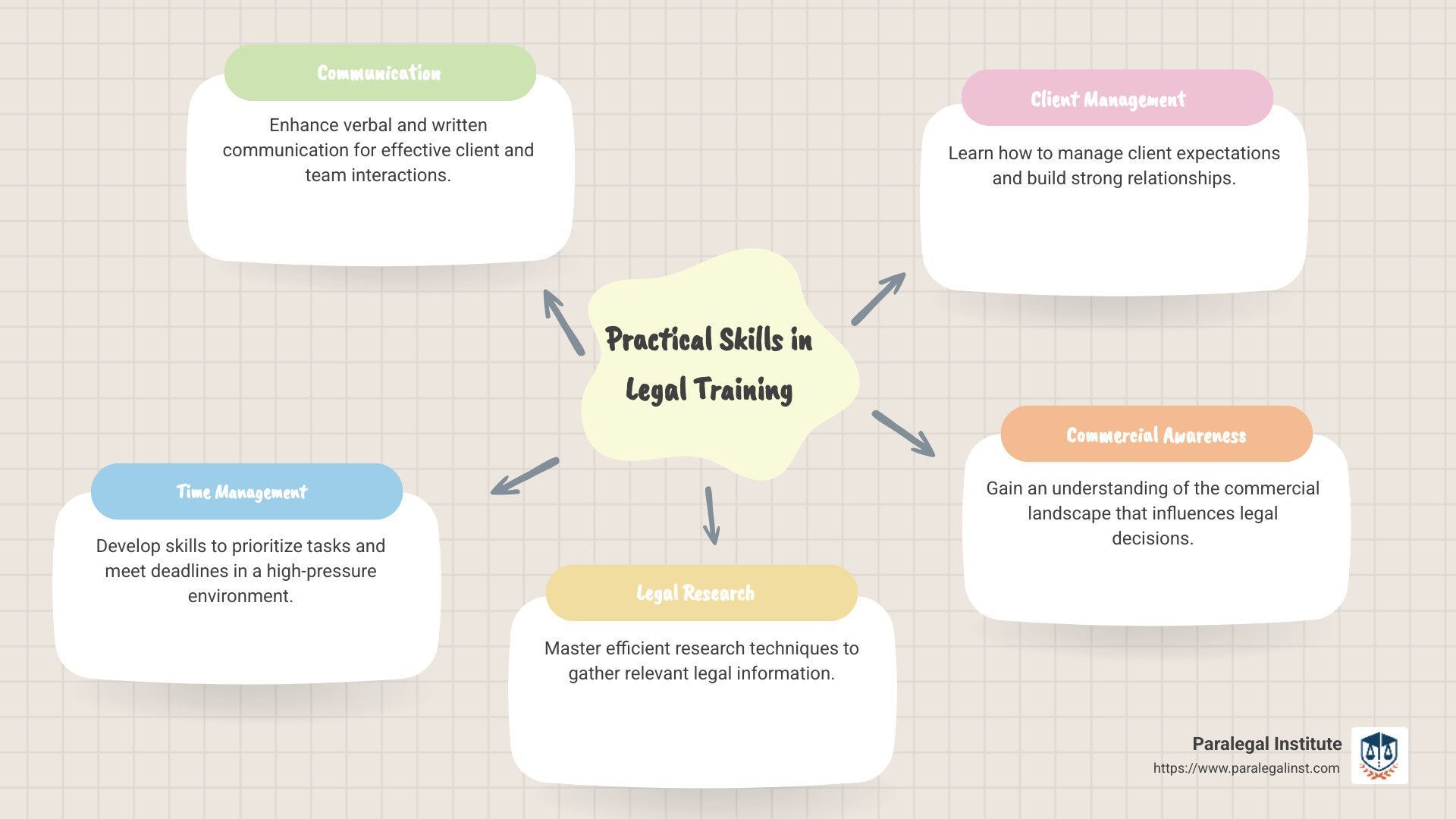From Classroom to Courtroom: The Essentials of Professional Legal Training
Professional legal training course programs provide crucial bridges between academic learning and the practical skills necessary for success in the legal field. These courses are custom to help aspiring legal professionals gain the skills they need without the extended time commitments and costs associated with traditional legal education paths.
Key aspects of professional legal training courses include:
- Practical Skills: Emphasize real-world applications to ensure job readiness.
- Flexibility: Often offer part-time or remote learning to accommodate work-study balances.
- Affordability: More cost-effective compared to traditional legal schooling.
- Certificates: Offers paralegal certificates to aid job prospects in law firms.
Professional legal training equips participants with both the theoretical understanding and practical abilities critical for navigating legal environments.
As a seasoned legal professional with a passion for education, I'm Matthew Pfau. I have experience in developing legal training courses, particularly those that equip individuals with paralegal certificates. This knowledge drives my dedication to guiding aspiring legal professionals towards effective training solutions for their careers.

Understanding Professional Legal Training Courses
Professional legal training courses are designed to bridge the gap between academic learning and the practical skills needed in the legal profession. These courses are essential for those who want to transition smoothly from law school to a real-world legal environment.
Formal Legal Training: This typically begins with an undergraduate degree from a recognized university. Law school provides the foundational knowledge of legal principles, but it often lacks a focus on practical application. This is where professional legal training courses come into play.
Law School vs. Practical Experience: While law school equips students with theoretical knowledge, it often falls short in offering hands-on experience. Professional legal training courses fill this gap by emphasizing practical skills. They offer simulations and real-life scenarios that prepare students for what they will face in a legal setting.
- Practical Skills: Courses focus on essential skills like legal writing, research, and client management. For instance, students might write demand letters, file lawsuits, and conduct research, all within a controlled learning environment. This hands-on approach ensures they are ready to hit the ground running in a law firm.
- Flexibility and Accessibility: Many of these courses are offered online, making them accessible to a wider audience. This flexibility allows participants to learn at their own pace, balancing other commitments while gaining valuable skills.
- Career Development: Completing a professional legal training course can significantly improve career prospects. It demonstrates to employers that a candidate is not only knowledgeable but also prepared to apply that knowledge effectively.
Professional legal training courses provide the practical experience that complements formal legal education, ensuring that graduates are well-prepared for the demands of the legal profession.
The Role of Professional Legal Training in Legal Careers
Professional legal training plays a vital role in shaping successful legal careers. It bridges the gap between theoretical knowledge and practical skills, ensuring that legal professionals are well-equipped for the demands of the job.
Career Development
For aspiring legal professionals, completing a professional legal training course is a significant step in career development. It improves one's resume by showcasing practical skills that are highly valued by employers. In a competitive job market, having hands-on experience can set candidates apart and increase their chances of landing desirable positions.
Legal Professionals and Practical Skills
Legal professionals need more than just a deep understanding of the law; they need practical skills to steer the complexities of real-world cases. Courses like those offered by the Paralegal Institute focus on developing these skills. Students engage in activities such as writing legal documents, conducting research, and managing client relationships.
- Communication: Legal professionals must communicate effectively with clients, colleagues, and the court. Training courses emphasize clear and persuasive communication, a crucial skill for any lawyer.
- Time Management: With tight deadlines and demanding schedules, time management is essential. Courses teach students to prioritize tasks and manage their time efficiently.
- Research: The ability to conduct thorough research and analyze statutes is fundamental. Training programs provide students with the tools and techniques needed to excel in legal research.
Practical Experience
Professional legal training provides a controlled environment to practice and refine these skills. For example, students might simulate court cases or participate in mock trials. This practical experience is invaluable, as it prepares them for the realities of working in a law firm or other legal settings.
In summary, professional legal training courses are crucial for career advancement in the legal field. They equip students with the necessary practical skills and experience, making them job-ready and attractive to potential employers.
Key Components of a Professional Legal Training Course
Practical Skills Training
A professional legal training course is not just about learning the law—it's about mastering the skills needed to apply it. Practical skills training is at the heart of these courses. Students engage in real-world scenarios, like drafting legal documents, conducting client interviews, and performing legal research. These activities help build confidence and competence.
- Legal Writing: Students learn to draft clear and concise legal documents. This skill is crucial, as precise writing can make or break a case.
- Client Interaction: Courses often include role-playing exercises to simulate client meetings. This practice helps students learn to listen actively and communicate effectively.
- Research Techniques: Students are taught to steer legal databases and analyze statutes. This skill is essential for building strong cases and providing sound legal advice.
Ethics
Ethics is a cornerstone of the legal profession. A professional legal training course emphasizes the importance of ethical behavior in all aspects of legal work. Students explore real-life ethical dilemmas and learn how to steer them. This training ensures that future legal professionals uphold the highest standards of integrity and professionalism.
- Confidentiality: Students learn the importance of maintaining client confidentiality and the consequences of breaches.
- Conflict of Interest: Training includes identifying and managing conflicts of interest, ensuring fair and unbiased representation.
Practice Management
Understanding the business side of law is crucial for any legal professional. Practice management training covers essential topics like time management, billing, and client relations. These skills help students transition smoothly into professional roles, where they must juggle multiple responsibilities.
- Time Management: Students learn to prioritize tasks and manage deadlines effectively. This skill is critical in a legal environment with tight schedules.
- Billing Procedures: Training includes accurate timekeeping and billing practices, ensuring that students are prepared for the financial aspects of legal work.
- Client Relations: Building and maintaining strong client relationships is key. Students practice skills in communication and empathy to foster trust and rapport.
A professional legal training course is a comprehensive program that equips students with the essential skills needed to thrive in the legal profession. By focusing on practical skills, ethics, and practice management, these courses prepare students for the challenges and responsibilities of a legal career.
The Paralegal Institute's Approach to Legal Training
At the Paralegal Institute, we believe in an approach to legal training that combines an accelerated curriculum with hands-on learning. Our goal is to provide students with practical skills and knowledge in a format that suits their lifestyle and career goals.
Accelerated Curriculum
Our curriculum is designed to get students ready for the legal world quickly. We offer a 15-week course that covers both the "how" and "what" of being a paralegal. This means that students learn practical skills and substantive law simultaneously. This approach ensures that students can hit the ground running once they enter the workplace.
- Structured Learning: Courses meet once a week for three hours, focusing on both practical aspects, like drafting documents, and substantive law, such as torts and contracts.
- Expert Instructors: Our instructors are seasoned legal professionals who bring real-world experience into the classroom, making learning relevant and applicable.
Hands-On Learning
We emphasize hands-on learning by immersing students in scenarios that mimic real legal cases. This experiential approach helps students understand the practical application of legal concepts.
- Simulated Law Firm Experience: Students work on a fictional case in the "Almost Attorney Law Firm." This involves drafting demand letters, filing lawsuits, and preparing for motions, providing a taste of what to expect in a real legal setting.
- Role-Playing Exercises: Students engage in exercises that simulate client meetings and court proceedings, helping them develop vital skills in communication and legal strategy.
Online and In-Person Options
Flexibility is key in today's world. The Paralegal Institute offers both online and in-person learning options to accommodate different learning styles and schedules.
- Online Learning: Our online classes use virtual classrooms and learning software, allowing students to learn from anywhere. This is ideal for those who need to balance work, family, and education.
- In-Person Classes: For those who prefer a traditional classroom setting, we offer in-person classes at our Las Vegas, NV location. These classes provide direct interaction with instructors and peers.
By integrating an accelerated curriculum with hands-on learning and flexible delivery methods, the Paralegal Institute ensures that students are well-prepared for their legal careers. Our approach not only imparts knowledge but also builds the confidence and skills essential for success in the legal field.
Frequently Asked Questions about Professional Legal Training
What is considered formal legal training?
Formal legal training typically begins with an undergraduate degree from a recognized university. This foundational education is crucial for gaining a comprehensive understanding of legal principles. After this, many aspiring legal professionals pursue specialized training courses, like those offered at the Paralegal Institute, to gain practical skills and real-world experience.
How long is a typical professional legal training course?
A typical professional legal training course can vary in length. At the Paralegal Institute, we offer a 10-week course that is conducted through remote learning. This format is designed to fit into the busy lives of our students, allowing them to learn from the comfort of their own homes while still receiving a comprehensive education in legal practice.
What are the benefits of completing a professional legal training course?
Completing a professional legal training course offers numerous benefits:
- Career Readiness: Our courses equip students with the skills needed to transition smoothly from the classroom to the courtroom. This readiness is crucial for those looking to enter the legal workforce quickly and effectively.
- Practical Skills: Students gain hands-on experience in tasks like drafting legal documents and preparing for court cases. These skills are essential for success in any legal role and set our graduates apart from their peers.
By enrolling in a professional legal training course at the Paralegal Institute, students not only improve their legal knowledge but also improve their career prospects by acquiring practical skills that are in high demand in the legal industry.
Conclusion
The journey from classroom to courtroom is a significant step in any legal career. At the Paralegal Institute, we focus on bridging this gap with our specialized legal education programs. Our courses are designed to equip students with the practical skills necessary for immediate workforce entry.
What sets us apart is our accelerated, hands-on curriculum. Developed by practicing legal professionals, our program offers a real-world approach to learning. This ensures that our students are not only knowledgeable but also prepared for the dynamic nature of legal work.
Whether you choose our online or in-person options, you will receive a comprehensive education that prepares you for the challenges of the legal field. By focusing on practical skills and real-world applications, we help our students transition smoothly into their careers.
If you're ready to advance your legal career, explore our programs and see how the Paralegal Institute can support your journey. Find more about our courses here.
More from The Paralegal Hub
Ready for a Career Change?
Paralegal Institute. All Rights Reserved.










